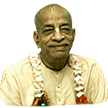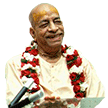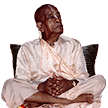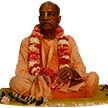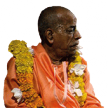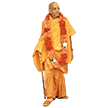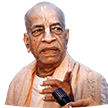Omkara - an essential subject: Difference between revisions
Nayanranjani (talk | contribs) (Created page with "Category:Essential Subjects <!----------------------- edit below this line -----------------------> <!------------------------ begin introduction text below ------------...") |
(Vanibot #0041: Moves Choose Another box to the end) |
||
| Line 2: | Line 2: | ||
<!----------------------- edit below this line -----------------------> | <!----------------------- edit below this line -----------------------> | ||
<!------------------------ begin introduction text below ------------------------> | <!------------------------ begin introduction text below ------------------------> | ||
'Oṁ', also known as 'oṁkāra', is a symbol of the Hindu religion. In all the Vedic mantras, 'om' is a transcendental sound vibration, and since it is prominent in all the hymns of the four Vedas, it is understood to be a representation of Lord Kṛṣṇa. In the Bhagavad-gītā, Lord Kṛṣṇa says that He is 'praṇavaḥ sarva-vedeṣu', the syllable oṁ in the Vedic mantras. Since oṁkāra is the basic principle of all Vedic knowledge, it is uttered before one begins to chant any Vedic hymn. Without the oṁkāra, no Vedic mantra is successful. | |||
Srila Prabhupada's books, lectures, conversations and letters offer a comprehensive presentation of this essential subject as seen in the Vaniquotes '''[[Vaniquotes:Category:Omkara|Omkara]]''' category. An introduction from his books is given below in the following | Srila Prabhupada's books, lectures, conversations and letters offer a comprehensive presentation of this essential subject as seen in the Vaniquotes '''[[Vaniquotes:Category:Omkara|Omkara]]''' category. An introduction from his books is given below in the following 8 quotes. | ||
<!-------- end introduction text and don't touch next three lines ---------> | <!-------- end introduction text and don't touch next three lines ---------> | ||
---- | ---- | ||
== Quotes from Srila Prabhupada's books == | == Quotes from Srila Prabhupada's books == | ||
<!----------------- edit quote boxes below this line -----------------> | <!----------------- edit quote boxes below this line -----------------> | ||
{{VaniQuotebox| | {{VaniQuotebox|Persons who are learned in the Vedas, who utter omkara and who are great sages in the renounced order enter into Brahman. Desiring such perfection, one practices celibacy|Persons who are learned in the Vedas, who utter oṁkāra and who are great sages in the renounced order enter into Brahman. Desiring such perfection, one practices celibacy. I shall now briefly explain to you this process by which one may attain salvation. Lord Śrī Kṛṣṇa has recommended to Arjuna the practice of ṣaṭ-cakra-yoga, in which one places the air of life between the eyebrows. '''(Bhagavad-gītā 8.11)'''}} | ||
{{VaniQuotebox| | {{VaniQuotebox|Pranava (om), or the omkara in the Vedas, is the primeval hymn. This transcendental sound is identical with the form of the Lord. All the Vedic hymns are based on this pranava omkara|Praṇava (oṁ), or the oṁkāra in the Vedas, is the primeval hymn. This transcendental sound is identical with the form of the Lord. All the Vedic hymns are based on this praṇava oṁkāra. Tat tvam asi is but a side word in the Vedic literatures, and therefore this word cannot be the primeval hymn of the Vedas. Śrīpāda Śaṅkarācārya has given more stress on the side word tat tvam asi than on the primeval principle oṁkāra. '''(Śrīmad-Bhāgavatam, Introduction)'''}} | ||
{{VaniQuotebox| | {{VaniQuotebox|Sankaracarya has indirectly minimized the value of the principal Vedic mantra (omkara) by accepting a subordinate vibration (tat tvam asi) as the most important Vedic mantra|The name of the Lord can be chanted by one who is completely freed from material contamination (anyābhilāṣitā-śūnyaṁ jñāna-karmādy-anāvṛtam (Bhakti-rasāmṛta-sindhu 1.1.11)). Śaṅkarācārya has indirectly minimized the value of the principal Vedic mantra (oṁkāra) by accepting a subordinate vibration (tat tvam asi) as the most important Vedic mantra. '''(Caitanya-caritāmṛta, Madhya-līlā 6.175)'''}} | ||
{{VaniQuotebox| | {{VaniQuotebox|The difference between chanting omkara and chanting the Hare Krsna mantra is that the Hare Krsna mantra may be chanted without consideration of the place or the sitting arrangements recommended in Bhagavad-gita|In all Vedic literatures, the sound vibration oṁkāra is the beginning. Oṁ namo bhagavate vāsudevāya. The difference between chanting oṁkāra and chanting the Hare Kṛṣṇa mantra is that the Hare Kṛṣṇa mantra may be chanted without consideration of the place or the sitting arrangements recommended in Bhagavad-gītā. '''(Śrīmad-Bhāgavatam 7.15.31)'''}} | ||
{{VaniQuotebox| | {{VaniQuotebox|After being situated in this yoga practice and vibrating the sacred syllable om, the supreme combination of letters, if one thinks of the Supreme Personality of Godhead and quits his body, he will certainly reach the spiritual planets|After being situated in this yoga practice and vibrating the sacred syllable oṁ, the supreme combination of letters, if one thinks of the Supreme Personality of Godhead and quits his body, he will certainly reach the spiritual planets. '''(Bhagavad-gītā 8.13)'''}} | ||
{{VaniQuotebox| | {{VaniQuotebox|All the activities of the senses should be offered into the mind, which should be offered into one's words. Then one's words should be offered into the aggregate of all alphabets, which should be offered into the concise form omkara|The mind is always agitated by waves of acceptance and rejection. Therefore all the activities of the senses should be offered into the mind, which should be offered into one's words. Then one's words should be offered into the aggregate of all alphabets, which should be offered into the concise form oṁkāra. Oṁkāra should be offered into the point bindu, bindu into the vibration of sound, and that vibration into the life air. Then the living entity, who is all that remains, should be placed in Brahman, the Supreme. This is the process of sacrifice. '''(Śrīmad-Bhāgavatam 7.15.53)'''}} | ||
{{VaniQuotebox| | {{VaniQuotebox|Factually the transcendental sound omkara, although a combination of the three letters a, u and m, has transcendental potency, and one who chants omkara will very soon realize omkara and Lord Visnu to be nondifferent|Factually the transcendental sound oṁkāra, although a combination of the three letters a, u and m, has transcendental potency, and one who chants oṁkāra will very soon realize oṁkāra and Lord Viṣṇu to be nondifferent. Kṛṣṇa declares, praṇavaḥ sarva-vedeṣu: "I am the syllable oṁ in the Vedic mantras." '''(Caitanya-caritāmṛta, Ādi-līlā 7.128)'''}} | ||
{{VaniQuotebox| | {{VaniQuotebox|Omkara is beginningless, changeless, supreme and free from deterioration and external contamination|On the basis of all the Upaniṣads, Śrīla Jīva Gosvāmī says that oṁkāra is the Supreme Absolute Truth and is accepted as such by all the ācāryas and authorities. Oṁkāra is beginningless, changeless, supreme and free from deterioration and external contamination. Oṁkāra is the origin, middle and end of everything, and any living entity who thus understands oṁkāra attains the perfection of spiritual identity in oṁkāra. '''(Caitanya-caritāmṛta, Ādi-līlā 7.128)'''}} | ||
<!----------------- edit quote boxes above this line -----------------> | <!----------------- edit quote boxes above this line -----------------> | ||
| Line 31: | Line 31: | ||
'''Omkara - [[Vaniquotes:Category:Omkara|explore more within this category]]'''. | '''Omkara - [[Vaniquotes:Category:Omkara|explore more within this category]]'''. | ||
{{EsentialSubjectTotal}} | {{EsentialSubjectTotal}} | ||
<div style="float:left;"> | |||
{{EssentialSubjectnav}} | |||
</div> | |||
__NOTOC__ | __NOTOC__ | ||
__NOEDITSECTION__ | __NOEDITSECTION__ | ||
Latest revision as of 17:03, 22 November 2020
'Oṁ', also known as 'oṁkāra', is a symbol of the Hindu religion. In all the Vedic mantras, 'om' is a transcendental sound vibration, and since it is prominent in all the hymns of the four Vedas, it is understood to be a representation of Lord Kṛṣṇa. In the Bhagavad-gītā, Lord Kṛṣṇa says that He is 'praṇavaḥ sarva-vedeṣu', the syllable oṁ in the Vedic mantras. Since oṁkāra is the basic principle of all Vedic knowledge, it is uttered before one begins to chant any Vedic hymn. Without the oṁkāra, no Vedic mantra is successful.
Srila Prabhupada's books, lectures, conversations and letters offer a comprehensive presentation of this essential subject as seen in the Vaniquotes Omkara category. An introduction from his books is given below in the following 8 quotes.
Quotes from Srila Prabhupada's books
Omkara - explore more within this category.
Vanipedia has now over 903 introductory articles compiled from Srila Prabhupada's books under the series titled Essential Subjects. All these articles can be seen in the Table of Content on the right side of this article and also here in this Umbrella Category. Browse through them to relish the breadth and depth of Srila Prabhupada's teachings - There is a subject for everyone.
